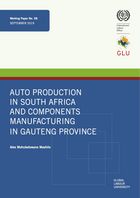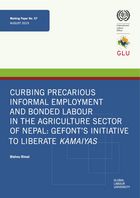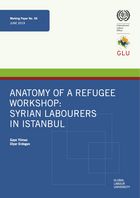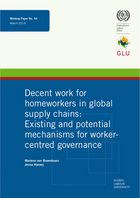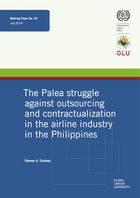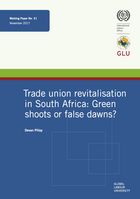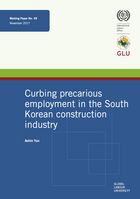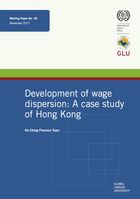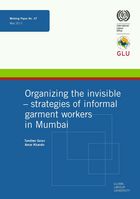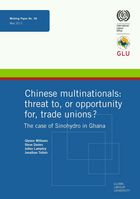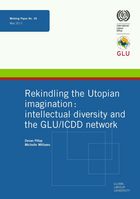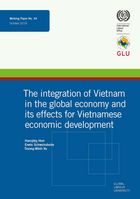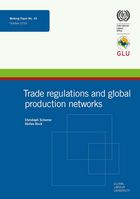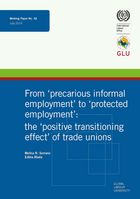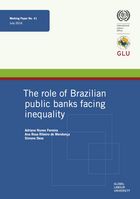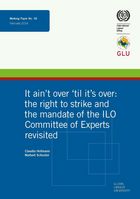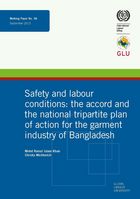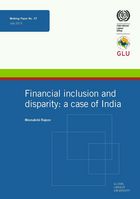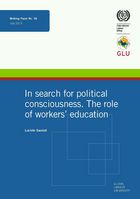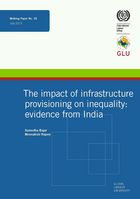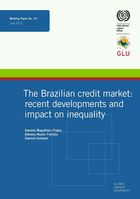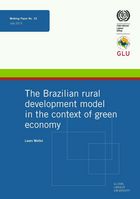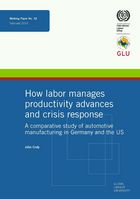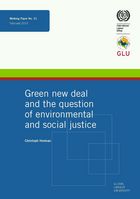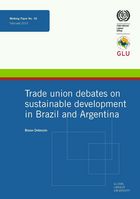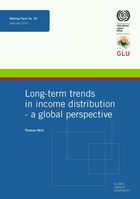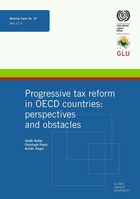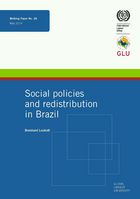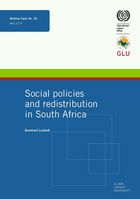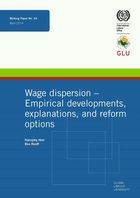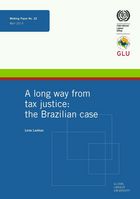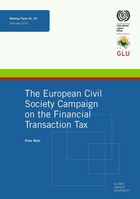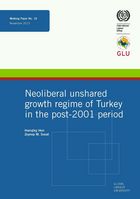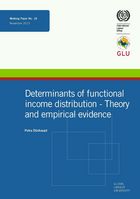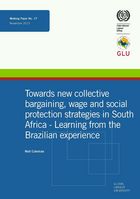GLU Publications
GLU Working Papers
No. 58 | September 2019
Auto production in South Africa and components manufacturing in Gauteng Province
by Alex M Mashilo
This paper presents an exposition of the state, contribution and performance of automotive Global Value Chains in South Africa with a focus on manufacturing. The research process followed was greatly supported by years of working experience in the industry. A survey was conducted to look at the state of social upgrading. This was followed by in-depth interviews focusing on firm-level economic upgrading. Extensive document analysis was conducted.
No. 57 | August 2019
Curbing precarious informal Employment and bonded Labour in the Agriculture Sector of Nepal: GEFONT's Initiative to liberate Kamaiyas
by Bishnu Rimal
The Kamaiya liberation campaign was one of the robust interventions of the General Federation of Nepalese Trade Unions (GEFONT), which aimed to put a stop to informal and forced (almost slavery in many dimensions) labour practices. The Kamaiya system was one of the most vulnerable bonded labour systems prevailing in Nepal until the last century. As Kamaiyas were in debt-bondage, they are compelled to work for a landlord from generation to generation.
No. 56 | June 2019
Anatomy of a refugee workshop: Syrian labourers in Istanbul
by Gaye Yilmaz and Diyar Erdogan
There is no doubt that any work carried out with refugees requires much greater sensitivity and care than others. On the other hand, if these studies have to be done with limited budgets in a very limited time, it may be harder to reach meaningful results without sacrificing the necessary sensitivity. Unlike many other works which solely focus on the results, in this study, we aim to bring to light the proceedings of a refugee labour workshop, collaboratively organized by Global Labour University (GLU) Alumnis in Turkey, the ICDD and Kassel University, which, though operated within a limited timeframe and a stringent budget, attained unexpected positive results.
No. 55 | May 2019
Organising against all odds: Precarious workers as ‘actors and authors of their own drama’
by Edlira Xhafa
The insecurity and instability experienced by precarious workers, and their ‘disconnect’ from the established groups, are often intertwined in the perception that these workers are unorganisable. This paper challenges this perception through seven stories of collective organising, which show that pockets of collective resistance can emerge amongst various group of precarious workers, from both traditional and non-traditional sectors of the working class, despite the level of precarity and the level of repression and hostility in the context where collective organising takes place.
No. 54 | March 2019
Decent Work for Homeworkers in Global Supply Chains: Existing and Potential Mechanisms for Worker-Centred Governance
by Marlese von Broembsen and Jenna Harvey
As informal wage-workers who lack recognition and legal and social protections, homeworkers face a range of decent work deficits. This paper analyses the potential of existing national and global governance mechanisms to address four of these deficits for homeworkers in global supply chains: Instability and insecurity of work; unsafe working conditions; poor wages; and a lack of freedom of association and the right to collective bargaining..........
No. 53 | July 2018
The Role of Small and Medium-sized Enterprises in Development: What Can be Learned from the German Experience?
by Hansjörg Herr and Zeynep M. Nettekoven
Small and medium-sized enterprises (SMEs) play an important role for development. Of importance are Schumpeterian SMEs, which include start-ups that trigger innovation, boost productivity and bring about structural change. Normal SMEs, which only adjust to market pressure, are also important for development and employment.........
No. 52 | July 2018
The PALEA Struggle Against Outsourcing and Contractualization in the Airline Industry in the Philippines
by Ramon A. Certeza
The paper tells the story of the drawn-out struggle of the Philippine Airlines Employees Association (PALEA) to reverse the trend of outsourcing in the Philippine Airlines (PAL). It highlights the fight-back strategies adopted by PALEA in its attempt to stop the contractualization of labour in the airline industry.
Through a combination of traditional and innovative strategies, including a well-planned and coordinated national campaign that involved different sectors of Philippines society, trade unions from other countries, and international trade union support organizations, PALEA was able to achieve initial victories........
No. 51 | November 2017
Trade union revitalisation in South Africa: Green shoots or false dawns?
by Devan Pillay
In South Africa a growing crisis of political legitimacy - given widening social inequality, high unemployment, persistent poverty, ecological devastation and increased corruption - has had a direct impact on the union movement. The National Union of Metalworkers of South Africa’s (NUMSA’s) 2013 decision to break away from the alliance with the ruling African National Congress (ANC) and SA Communist Party (SACP), and build a broad united front and a ‘movement for socialism’, was momentous......
No. 50 | November 2017
“NUPENGASSAN” and the struggle against precarious work in the Nigerian oil and gas industry
by Baba Aye
The literature on informality is largely focused on the “informal sector” as a marginal or peripheral sphere of national economic life, beyond the pale of the leading formal industrial sectors, particularly in developing countries. This paper interrogates informalisation of labour and employment relations within the formal sector as its point of departure. The contemporary prevalence of precarious work which this foster is identified as a key element of the neoliberal agenda for keeping wages low and for maintaining social control....
No. 49 | November 2017
Curbing precarious informal employment: A Case Study of precarious workers in the South Korean construction industry
by Aelim Yun
The construction industry in Korea is characterized by a complex pyramid structure comprised of one main construction company (“main contractor”) and several layers of subcontractors. The prevailing form of employment relationship is informal and indirect employment via intermediaries or foremen. Construction workers are hired only for the period of a certain construction project. The number of economically dependent construction workers also rapidly increased since the late 1990s.
This case study focuses on the strategies of the Korean trade unions in their fight for precarious workers’ rights....
No. 48 | November 2017
Development of Wage Dispersion: A Case Study of Hong Kong
by Ho Ching Florence Yuen
In recent decades, economic performance of Hong Kong has been remarkable and currently its per capita income is amongst the highest in the world. Meanwhile, its income distribution is highly uneven compare to the major advanced economies. As employment income remains the largest constituent of household market income in Hong Kong, it is expected that the development of its earning inequality may have contributed to the high income inequality.
This paper aims to study how wage dispersion has been developed in Hong Kong since 1980s and to identify the reasons behind such development.......
No. 47 | May 2017
Organizing the invisible – strategies of informal garment workers in Mumbai’s slum economy
by Tandiwe Gross and Amar Kharate
Dharavi in the heart of Mumbai is home to an estimated 1 million people and of the biggest slum economies in the world. With 86% of India’s total workforce working in the informal sector, this papers sheds light on the working and living conditions of a section of this invisible workforce as well as their collective struggles and organizing strategies for a more decent life.
The empirical findings suggest that despite massive barriers to organising, informal garment workers develop innovative strategies to gain victories both vis-à-vis employers and the state by organising collectively. The entry point are workers’ identities as women and citizens and their struggles around domestic violence, harassment housing and public services. For many workers the trade union membership card gains importance as the first written proof of identity and the support of the collective serves as a protection against violence at home and in the community.
No. 46 | May 2017
Chinese multinationals: threat to, or opportunity for, trade unions?: The case of Sinohydro in Ghana
by Glynne Williams, Steve Davies, Julius Lamptey and Jonathan Tetteh
There is a growing literature on global Chinese companies, but this tends to be at a very general level. There is little research to date on the effect of Chinese involvement on workers and their unions. Although focussed on one company, SINOHYDRO, this paper addresses questions of importance to construction unions globally: What is the impact of growing Chinese MNC involvement and how should unions respond? This paper puts the experience of workers at SINOHYDRO in Ghana into perspective and argues that: there is value in standardising and formalising industrial relations practices in MNCs through an International Framework Agreement; without workplace militancy and solidarity there is little chance of progress in bargaining; ....
No. 45 | May 2017
Rekindling the Utopian imagination: intellectual diversity and the GLU/ICDD network
by Devan Pillay and Michelle Williams
A delegation of labour scholars and practitioners first came to our university, the University of the Witwatersrand in South Africa, in 2006, to engage with colleagues about establishing the Global Labour University on our campus. It was to be the second site after Germany, and we were all intrigued by the concept. While some of our colleagues were initially sceptical about the GLU, believing that it might be a northern imposition within the narrow confines of 20th century models that privilege formalised or established labour, corporatist social partnership and narrow workplace bargaining, we were happy to hear that some amongst the delegation had a ‘Marxist’ orientation and were sensitive to relations between the global North and the global South. This gave a sense of comfort to those amongst us who believed that the challenges of our time demanded a wider consideration of the totality of globalised capitalism, and its differential impacts on the world, North and South.
No. 44 | October 2016
The integration of Vietnam in the global economy and its effects for Vietnamese economic development
by Hansjörg Herr, Erwin Schweisshelm and Truong-Minh Vu
When Vietnam started the Đổi Mới (renovation) in the mid-1980s it was a backward agricultural country. Liberalising markets, allowing the establishment of private firms, integrating in the world economy and high FDI inflows stimulated growth and productivity development. However, this first face of development seems to be exploited and Vietnam is in danger to fall in a period of low growth, low productivity increases and no convergence with more developed countries. Vietnam is at the lowest end of global value chains in industrial productions and at the same time depends on the export of natural resources. Market mechanisms are reproducing this type of underdevelopment.
No. 43 | October 2016
Trade regulations and global production networks : what is the current impact and what would help to improve working conditions throughout the supply chains?
by Christoph Scherrer and Stefan Beck
This study provides an overview of some, not all initiatives to improve working conditions throughout global production networks. On the basis of secondary sources it assesses the contribution of the instruments favored by these initiatives. It starts with an economic justification of international workers’ rights.
The debate about international workers’ rights revolves primarily around enforcing standards in developing countries. Opponents of internationally enforced workers’ rights see them as an obstacle to closing the industrial gap. They argue that better living and working conditions cannot be legislated but would be the natural outcome of industrialization.
No. 42 | July 2016
From ‘precarious informal employment’ to ‘protected employment’: the ‘positive transitioning effect’ of trade unions
by Melisa R. Serrano and Edlira Xhafa
This paper aims at contributing to the discussions on the challenge of transitioning from precarious informal employment to more protected employment. This paper looks into a rather under-researched area—the role of trade unions in facilitating this process of ‘transitioning’ as well as in containing the spread of this type of employment. We refer to this process, along with its outcomes, as the 'positive transitioning effect' of trade unions. Through 10 case studies from nine countries (Brazil, India, Israel, Nepal, Nigeria, the Philippines, South Korea, the UK, and Zambia), the paper analyses several factors, such as the legal framework (i.e., labour laws and regulations), economic and social protection measures beyond the labour law, union's organisation structures and processes, and union strategies and measures, that influence the success of various ‘transitioning’ initiatives undertaken either solely by trade unions or in collaboration with other organisations.
No. 41 | July 2016
The role of Brazilian public banks facing inequality: some reflections on the case of Brazilian development bank, Caixa and the federal regional banks
by Adriana Nunes Ferreira, Ana Rosa Ribeiro de Mendonça and Simone Deos
In capitalist economies, money is a strategic asset as liquidity is desirable since the future is unknown and uncertainty exists. In these economies, banks are key agents, being creators of endogenous money. And like all capitalist agents, banks make decisions in pursuit of capital valorization and have liquidity preference. At the same time, they play an important role in financing fundamental spending decisions, which contribute to income and employment creation, and are crucial to promote economic and social development....
No. 40 | February 2016
It ain’t over ‘til it’s over: The right to strike and the mandate of the ILO committee of experts revisited
by Claudia Hofmann and Norbert Schuster
For many years now, the question of whether the standards of the International Labour Organization (ILO), and the provisions of Convention No. 87 on Freedom of Association and Protection of the Right to Organize (1948) in particular, implied the existence of a right to strike was the subject of a controversy among the tripartite constituents. The debate escalated in 2012, when no agreement was reached at the International Labour Conference of the ILO regarding the adoption and discussion of a list of 25 Member States that stood accused of serious breaches of ILO Conventions. Since then, this issue had continued to hamper the process of supervising the application of ILO Conventions.
No. 39 | February 2016
Labour Market Developments in Germany: Tales of Decency and Stability
by Bea Ruoff
Labour market developments in Germany can be separated into two major shocks: German reunification in the early 1990s, and the Hartz reforms in the early 2000s. In this paper it is argued that these two shocks divide the German wage bargaining system into the old labour market system, which is characterised by a high degree of coordination through pattern bargaining, and the new dual labour market system, where pattern bargaining exists to some extent but is characterized by a marked increase in precarious work. The consequences of these developments for the alleged “stable” and “decent” German labour market are outlined and policy proposals by the German Confederation of Trade Unions (DGB) to combat unnoticed (or condoned) dualism and its repercussions are discussed.
No. 38 | July 2015
Safety and Labour Conditions : the Accord and the National Tripartite Plan of Action for the Garment Industry of Bangladesh
by Mohd Raisul Islam Khan and Christa Wichterich
The factory fire at Tazreen Fashions in 2012 and the collapse of the Rana Plaza in 2013 generated a huge outcry about the working conditions and labour relations in the Readymade Garment (RMG) industry in Bangladesh, and led to the adoption of the multi-stakeholder agreements Accord on Fire and Building Safety in Bangladesh (Accord) at the international level and the National Tripartite Plan of Action (NTPA) at the domestic level. This paper investigates how the Accord and the NTPA have been implemented in the first two years after their adoption, whether they have contributed to an overall improvement in safety and labour conditions as well as to organizing in the RMG sector, and whether they can be considered as a “major breakthrough” and “game changer”.
No. 37 | July 2015
Financial Inclusion and Disparity: A Case of India
by Meenakshi Rajeev
This paper highlights the inequality in financial penetration and usage in India, based on macro level data, and shows how certain regions, such as the Northeastern or Eastern of the country need special attention by the policy makers. Credit schemes need to be formalized so that the weaker regions and socially disadvantaged sections, especially in the lower income categories, receive better access to formal credit. Based on the analysis of unit record (household level) data from the National Sample Survey Organisation (NSSO), the gender-wise inequality is also considered persistent, particularly regarding access to credit.
No. 36 | July 2015
In Search for Political Consciousness. The Role of Workers' Education
by Luciole Sauviat
Unionists and labour activists often speak about workers’ education, but what does the concept really imply and does it actually play a role for political consciousness? This paper is the synthesis of empirical studies from a Global Labour University (GLU) alumni research group on Workers' Education. Its uniqueness are case studies, where workers' education has been very seldom studied. Just to mention a few of the nine in depth field studies: shop steward training in Malawi, labour rights workshops in Indonesia, party education in a train depot in China, organising workshops in a syndicalist union in Canada.
No. 35 | July 2015
The Impact of Infrastructure Provisioning on Inequality: Evidence from India
by Sumedha Bajar and Meenakshi Rajeev
India witnessed high levels of growth in the last decade but national levels of poverty and inequality remain high. Infrastructure provision is seen as a particularly important instrument for helping in regional development where government can play a significant role due to the public goods nature of infrastructure facilities. Literature confirms the positive association between infrastructure and growth. However, it is not necessary that economic growth attributable to infrastructure development will consequently lead to a reduction in inequality. This paper analyses the links between physical infrastructure and inequality and determines the nature of this relation and focuses on 17 major Indian states.
No. 34 | July 2015
The Brazilian Credit Market: Recent Developments and Impact on Inequality
by Daniela Magalhães Prates, Adriana Nunes Ferreira and Daniela Gorayeb
The aim of this paper is analyzing the evolution of the Brazilian credit market from 2003 to 2011 and its impact on inequality in Brazil. The arguments are organized as follows. After an introductory section, the second one presents the determinants and the general trends of the banking credit market between December 2003 and December 2011, while the third section analyses the extent to which employment and incomes in the banking sector might have contributed to reduce the inequality in Brazil. The paper closes with some final remarks on the lessons that can be drawn from the Brazilian experience.
No. 33 | July 2015
The Brazilian Rural Development Model in the Context of Green Economy
by Lauro Mattei
This paper discusses the Brazilian rural development model in the context of Green Economy and the debate about sustainable development, issues that have been discussed in international sphere. In this way, conceptions and new concepts have been defined which clarify the ideas and mechanisms involved in this new approach. In general terms, these conceptions and concepts have proposed the organization of another social order that looks beyond purely economic aspects.
No. 32 | February 2015
How labor manages productivity advances and crisis response: a comparative study of automotive manufacturing in Germany and the US
by John Cody
This research study will examine how labor manages productivity advances and crisis response in both the United States and Germany’s automobile manufacturing sector, particularly in the context of technological application, workplace organization, and the political economies of both countries. In the US, labor is increasingly challenged through reductions in the workforce and lower wages while in Germany, labor has remained resilient even during the global economic crisis of 2008. This paper utilizes in-depth interviews with key actors in the automotive industry, field research at automotive plants, and an examination of relevant literature and data. Among the areas examined are automation, workforce training regimes, institutional factors, and outsourcing.
No. 31 | February 2015
Green New Deal and the Question of Environmental and Social Justice
by Christoph Hermann
The financial and economic crisis was preceded by an energy, food and climate crisis. Until 2008, prices for oil, food and various minerals were increasing due to accelerating scarcity in peak capitalism. With the outbreak of the financial turbulences, the environmental problems shifted somewhat to the background, but various academics and policy makers emphasized the multiple nature of the current crisis. A number or organizations, subsequently, called for the adoption of a Green New Deal to tackle ecological and economic problems. The idea was that investments in energy efficiency and renewable energy production would improve ecological sustainability, while at the same time generating growth and creating jobs.......
No. 30 | February 2015
Trade union debates on sustainable development in Brazil and Argentina
by Bruno Dobrusin
This paper analyses the development strategies followed by the governments of Argentina and Brazil since the election of left-oriented parties (2002 in Brazil and 2003 in Argentina), and focuses on the role the trade union movement has had on their policies and how it challenged their growth strategies. The main argument is that both of these countries underwent significant socio-economic improvements since these governments were elected, but this development has mainly been based on their extractive industries, such as mining, forestry, transgenic agribusiness-based agriculture and oil. These activities have produced immense wealth, which these governments very effectively distributed focusing on the poorest sectors.
No. 29 | February 2015
Long-term trends in income distribution - a global perspective
by Thomas Obst
This paper provides a comprehensive overview of the development in income distribution and outlines its major long-term trends of 23 countries worldwide. These countries are clustered in four groups covering the core advanced, the Nordic, the emerging, and the least developed economies of the world. This paper applies different measures to analyse income distribution in three dimensions: national income, functional income distribution, and personal income distribution. Depending on the indicators applied the time period ranges between 1960 and 2012. The empirical analysis shows that increases in national incomes are most pronounced in the advanced economies.......
No. 27 | May 2014
Progressive tax reform in OECD countries : perspectives and obstacles
by Sarah Godar, Christoph Paetz & Achim Truger
In most OECD countries the redistributive effect of the tax system has been substantially weakened by deliberate tax policies over the last decades. Despite some signs that this trend may have recently come to a halt a comprehensive policy change is not underway. One major argument brought forward against such a change is that of a serious trade-off between equity and efficiency: According to the dominant view higher taxes on top personal incomes, corporate income and wealth are detrimental to growth and employment. This paper argues that even the dominating theoretical .....
No. 26 | May 2014
Social policies and redistribution in Brazil
by Bernhard Leubolt
This paper aims at analyzing the contribution of social policies to declining rates of income inequalities in Brazil since the 1990s. Based on a framework of historical institutionalism, Brazil is characterised as a traditionally patrimonial society, marked by the institution of slavery. Important ruptures occurred during democratization in the 1980s, when social movements successfully fought for social rights which featured prominently in the democratic constitution of 1988. During the 1990s a contradictory confluence of these achievements and neoliberal reforms ....
No. 25 | May 2014
Social policies and redistribution in South Africa
by Bernhard Leubolt
This paper aims at analyzing the effects of social policies on income inequalities in South Africa since the 1990s. Based on a framework of historical institutionalism, the heritage of a distributional regime based on institutional racism is highlighted. This had lasting effects on social policies which also had both liberal and conservative characteristics. Democratisation at the beginning of the 1990s led to the abolishing of institutional racism and conservative features, while the new framework tended to be of a more liberal nature than before. The Post-Apartheid .....
No. 24 | April 2014
Wage dispersion : empirical developments, explanations and reform options
by Hansjörg Herr & Bea Ruoff
Market driven wage dispersion is a critical feature of income inequality. In this paper especially the Keynesian perspective on how to explain the global trends of rising wage dispersion is elaborated. Special attention is given to the policy implications derived from the analysis. Keynesian theory suggests that wage dispersion is a result of weaker trade union power, a lack of wage bargaining coordination and an erosion of labour market institutions after the begin of the market radical globalisation project in the 1970s/1980s.....
No. 23 | April 2014
Inequality and the Financial System - The Case of Germany
by Daniel Detzer
This paper examines the relationship between changes in the financial sector and the increasing inequality in Germany. For this, first an overview about the development of the main inequality indicators for Germany is given, which show inequality has been rising since the 1980s. Thereafter, the main features of the German financial system and its main changes in the last decades are reviewed. It is also looked at employment and incomes in the financial sector to determine, whether exorbitant growth of the financial sector, as observed in other countries, could be responsible for the increasing inequality. .....
No. 22 | April 2014
A long way from tax justice: the Brazilian case
by Lena Lavinas in collaboration with Thiago Andrade Moellmann Ferro
This paper presents the major characteristics of the Brazilian tax system, after underlining the modifications it went through since 1988, when the country adopted a new and democratic Constitution. One important feature is the marked incidence of indirect consumer and production taxes (49% of all tax revenues) in place of direct taxes on income, inheritance, and capital gains. This imbalance between indirect and direct taxes explains, in large part, the elevated regressivity of the Brazilian tax system, which both expresses and reproduces the profound inequalities that characterize Brazilian society.
No. 21 | February 2014
Demystifying a 'shining example': German public finances under the debt brake
by Kai Eicker-Wolf and Achim Truger
German fiscal policy is nowadays often presented as a shining example due to successful budget consolidation after the Great Recession. However, the idea that the German success is the result of a well-thought-out economic strategy that could therefore serve as a role model for other countries does not stand up to closer scrutiny. First of all, Germany’s fiscal policy escaped from an absolutely bleak outlook just three years ago only due to extraordinarily good luck. …
No. 20 | February 2014
The European Civil Society Campaign on the Financial Transaction Tax
by Peter Wahl
The Financial Transaction Tax (FTT) has been a spearhead demand of civil society for some 15 years now. Initially put on the table by the UNDP in 1996 as an instrument of innovative financing for development, also its regulatory dimension surfaced after the Asian financial crisis 1997/98. While some governments were open to the idea, in particular France and Belgium, there was strong opposition from other countries such as the US and the UK and of the finance industry. Therefore, the FTT seemed to be doomed to disappear from the agenda.
No. 19 | November 2013
Neoliberal Unshared Growth Regime of Turkey in the Post-2001 Period
by Hansjörg Herr and Zeynep M. Sonat
After the 2001 crisis, Turkey continued to pursue a radical market-oriented reform strategy that followed the philosophy of the Washington Consensus. By the early 2000s the government had already liberalised the capital account, privatised many banks and enterprises, and kick-started the processes of financialisation. The government had also withdrawn from redistribution and social justice policies. Gross domestic product (GDP) growth in the post-2001 period was relatively high, but it was a “jobless” growth caused by substantial productivity increases generated largely by intensifying the work process rather than by technological advancements...
No.18 | November 2013
Determinants of Functional Income Distribution – Theory and Empirical Evidence
by Petra Dünhaupt
Since the 1980s, the share of wages in national income declined almost all over the world. This paper provides an overview of the evolution of labour’s share in selected OECD countries. Several theoretical approaches explaining functional income distribution are summarised. In light of the different theoretical stances, this paper reviews the empirical literature on potential explanations for the prolonged fall...
No.17 | November 2013
Towards new Collective Bargaining, Wage and Social Protection Strategies in South Africa - Learning from the Brazilian Experience
by Neil Coleman
The Congress of South African Trade Unions COSATU has recognised that the South African labour movement is facing a major challenge in the functioning of labour market institutions inter alia because: collective bargaining institutions are fragmented and being constantly destabilised; there is no coherent wage policy in the country, to address poverty and inequality amongst workers; or a coherent framework to link our labour market strategies and institutions to a broader economic development strategy. At the heart of this paper therefore is an attempt to analyse fundamental shortcomings ....
No.16 | August 2012: Wage Policy Today
by Hansjörg Herr and Gustav A. Horn
No.15 | July 2012: Minimum Wage Development in the Russian Federation
by Anna Bolsheva
No.14 | September 2011: The Quest for Alternatives beyond (Neoliberal) Capitalism
by Melisa R. Serrano and Edlira Xhafa
No.13 | September 2011: All China Federation of Trade Unions: Structure, Functions and the Challenge of Collective Bargaining
by Rudolf Traub-Merz
No.12 | March 2011: The Implementation of Minimum Wage: Challenges and Creative Solutions
by Chiara Benassi
No. 11 | March 2011: Principles of Minimum Wage Policy - Economics, Institutions and Recommendations
by Hansjörg Herr and Milka Kazandziska
No. 10 | July 2010: Strategies for Closing the Representation Gap in Micro and Small Enterprises
by Christine Bischoff, Melisa Serrano, Edward Webster and Edlira Xhafa
No. 8 | February 2010: Developing a Labour Voice in Trade Policy at the National Level
by Donna McGuire, Christoph Scherrer et al
No. 7 | March 2009: Servitude with a Smile: An Anti-Oppression Analysis of Emotional Labour
by Patricia Chong
No. 6 | February 2009: The Theoretical Debate about Minimum Wages
by Hansjörg Herr, Milka Kazandziska, Silke Mahnkopf-Praprotnik
No. 5 | November 2008: FIFA World Cup 2006 Germany: An opportunity for union revitalisation?
by Wilfried Schwetz and Donna McGuire
No. 4 | November 2008: Marketization of the Chinese Labor Market and the Role of Unions
by Max J. Zenglein
No. 3 | November 2008: Closing the Representation Gap in Micro and Small Enterprises
by Edward Webster et al
No. 2 | February 2008: EU Multi-Level Trade Policy: Neither coherent nor development-friendly
by Birgit Mahnkopf
No. 1 | February 2008: Economic Policy, Globalization and the Labour Movement: Changes in the Global Economy from the Golden Age to the Neoliberal Era
by Seeraj Mohamed

